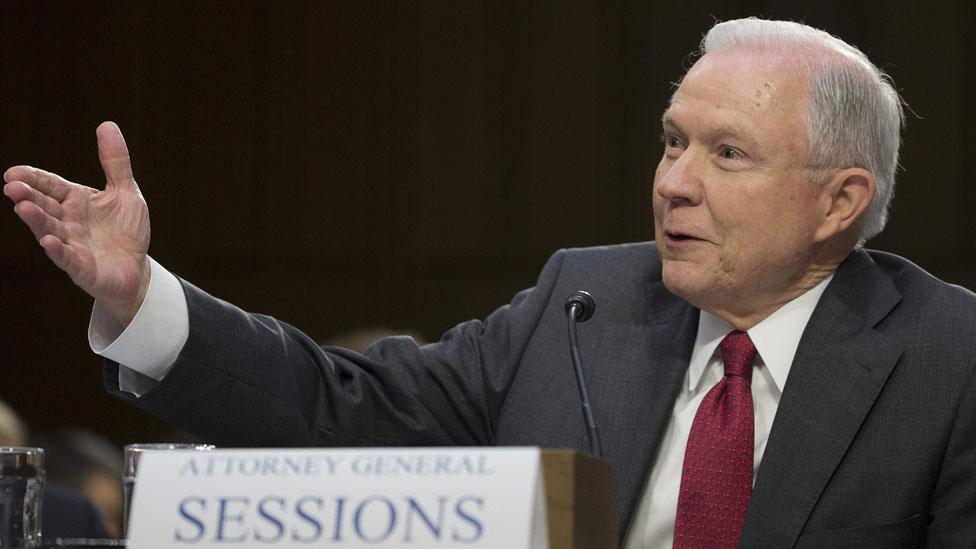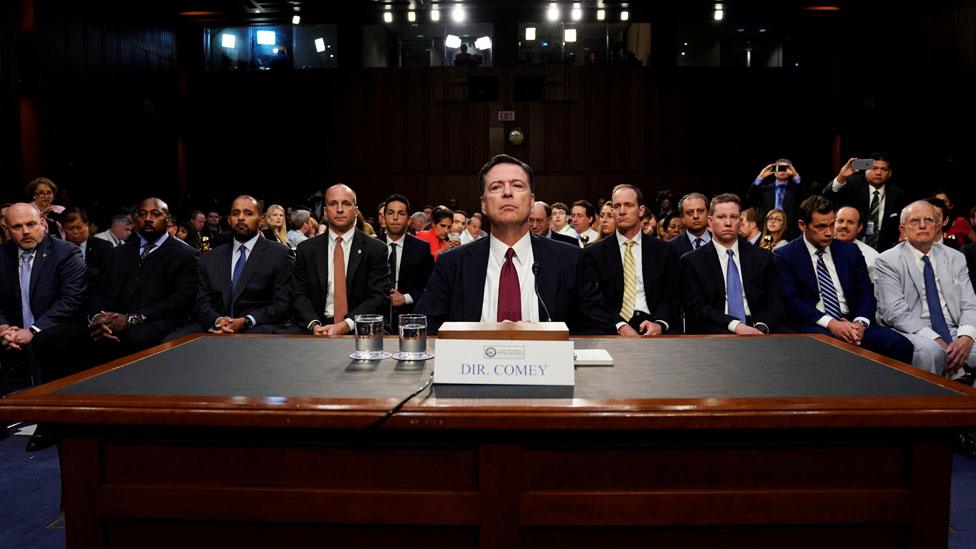What Sessions did (and didn't) tell us
- Published

The glimpse Jeff Sessions offered into the controversies bedevilling the Trump administration came through a glass, darkly.
During his testimony before the Senate committee investigating Russian meddling in the 2016 presidential campaign, he was often evasive. His accounting of details was uncertain, littered with "I don't recalls" and "I have no recollections".
Mr Sessions is far from the first politician to seek refuge in a fuzzy memory under sharp questioning. Definitive statements proven inaccurate under oath are more prone to accusations of perjury.
When it came time to discuss his conversations with the president, Mr Sessions demurred, noting that he wanted to give Mr Trump the opportunity to review the question before sharing his thoughts. It was as if the attorney general was trying to pre-emptively invoke executive privilege - the right of a president to candid counsel from his advisers - without using those magic words.
Where Mr Sessions's memory did serve him well, he forcefully condemned allegations of Russian collusion as "appalling and detestable".
The controversy at this point is about more than just collusion, however. It's about obstruction of justice and the circumstances around the firing of an FBI director. In those areas the attorney general did little to turn down the heat.
Going into Mr Sessions's testimony on Tuesday, there were some obvious questions he would face. Here's a look at how he answered (or, occasionally, didn't answer) them.

Did you have a previously undisclosed meeting with the Russian ambassador?
Jeff Sessions: Russia collusion claim a 'detestable lie'
The scene was the Mayflower Hotel in Washington, DC. The date was 27 April 2016. The event was a high-profile foreign policy speech by then-candidate Trump. Mr Sessions was in attendance, and Russian Ambassador Sergei Kislyak was sitting in the front row.
According to the attorney general's testimony, however, he didn't know Mr Kislyak was in the room (although a photograph showed them just a few metres apart at one point and reporters in the back of the room were buzzing about his presence). He said he didn't recall if he had any conversation with the ambassador, although it was "conceivable".
"I can assure you nothing improper, if I had a conversation with him," Mr Sessions said.
It was undisclosed meetings with Mr Kislyak - who is considered by some to be the top Russian spymaster in the US - that is widely considered to be behind Mr Sessions's February announcement that he would recuse himself from the Justice Department's investigation into possible ties between the Trump campaign and the Russian government.
Mr Sessions on Tuesday, however, said that his recusal was a result of Justice Department rules preventing him from overseeing an investigation into a campaign he was part of and not due to any personal activity.

Do you recall the president asking you to leave the Oval Office so he could speak to Comey alone?
It was a blockbuster story in the New York Times and one of the most gripping moments of last week's testimony from ex-FBI boss James Comey.
On 14 February, the former director said he was held back by the president during a national security meeting in the White House and, in private, pressured to curtail the ongoing FBI investigation into Mr Trump's former national security adviser, Michael Flynn.
On Tuesday Mr Sessions, at least in part, corroborated Mr Comey's account.
"We were there and I was standing there and without revealing any conversation that took place, what I recall is that I did depart and I believe everyone else did depart and Director Comey was sitting in front of the president's desk and they were talking," Mr Sessions said.
He continued that he didn't view such a meeting as necessarily problematic.
"I knew that Director Comey, long-time experienced individual of the Department of Justice, could handle himself well," he said.
Mr Comey, of course, characterised the meeting much differently - and said that Mr Sessions may have lingered because he knew that what the president was doing was inappropriate.
"His body language gave me the sense, like, 'What am I going to do?'" Mr Comey said.
Mr Trump's critics have said the president's decision to clear the room is an indication that he knew that what he wanted to discuss with his FBI director was inappropriate.
Mr Sessions's testimony gives no insight into the president's motivation, but one thing is certain - the private meeting did, in fact, happen.

Did Comey tell you he didn't want to be left alone with the president?

It was Comey's turn in the hot seat last week
During his testimony last week Mr Comey said that he reached out to the attorney general to say that he didn't want to be placed in the situation where he was alone with the president again.
"I took the opportunity to implore the attorney general to prevent any future direct communication between the president and me," he recalled. "I told the AG that what had just happened - him being asked to leave while the FBI director, who reports to the AG, remained behind - was inappropriate and should never happen. He did not reply."
Mr Sessions on Tuesday confirmed that Mr Comey contacted him, but he painted a somewhat different picture of the interaction.
"He expressed concern about that private conversation," Mr Sessions said.
The attorney general also said that he did, in fact, reply to the FBI director.
"He didn't recall this, but I responded to his comment by agreeing that the FBI and the Department of Justice needed to be careful to follow department policies regarding appropriate contacts with the White House," he said. "Mr Comey had served in the department for better than two decades and I was confident he understood and would abide by the well-established rules limiting communications with the White House, especially about ongoing investigations."
Both Mr Sessions and Mr Comey were testifying under oath, and both men generally agree on the circumstances of the events. From there, however, their views diverge considerably.

What were the circumstances of Comey's dismissal as FBI director?
Angry exchange at Sessions hearing
Mr Sessions has said he recommended that Mr Trump fire Mr Comey based on a memorandum written by Deputy Attorney General, which detailed disorder in the FBI and the director's poor handling of the Hillary Clinton email investigation.
On Tuesday he stood by his view, even though Mr Trump has said that he had made up his mind to fire Mr Comey before the attorney general's recommendation and that he did so with the director's handling of the Russia investigation in mind.
"We had problems there, and it was my best judgement that a fresh start at FBI was the appropriate thing to do," Mr Sessions said.
As for Mr Trump's comments about his reasons for the firing?
"I believe it has been made public that the president asked us our opinion and it was given and he asked us to put that in writing," he said. "I don't know how much more he said than that, but he talked about it and I would let his words speak for themselves."
Beyond that Mr Sessions would shed no further light on his interaction with the president regarding Mr Comey's dismissal, saying "that would call for a communication between the director and the president, and I'm not able to comment on that".
He did note, however, that his recusal from the Russia investigation did not prevent him from being involved in the hiring and firing of agencies within the Justice Department, including the FBI.
"It's my responsibility to our Judiciary Committee and other committees to ensure that that department is run properly," Mr Sessions said. "I have to make difficult decisions, and I do not believe that it is a sound position to say that, if you're recused for a single case involving any one of the great agencies like DEA or US Marshals or ATF that are part of the Department of Justice, you can't make a decision about the leadership in that agency."
It's worth noting, however, that at no time during the review of Mr Comey's leadership of the FBI were his perceived shortcomings discussed with him. His notice that Mr Comey's superiors were not happy, it seems, was first provided in the president's letter informing him of his dismissal.

Does the president have a secret White House recording system?
Guessing whether secret tapes of Mr Trump's conversation with Mr Comey exist is perhaps the favourite parlour game of Washington insiders these days. On Tuesday Mr Sessions got to play.
When Republican Senator Marco Rubio of Florida asked Mr Sessions if he knew the president records his Oval Office conversations, the attorney general said he did not.
"If any president was to record conversations in their official duties, would there be an obligation to preserve those records?" Mr Rubio then asked.
Probably so, was Mr Sessions's answer.
The president has said that the truth will be revealed soon enough, so it looks like everyone will have to wait until then.